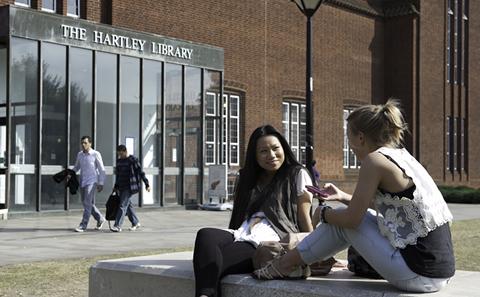
Life on campus
Discover more about living and studying at Southampton.
In the top 100 of universities globally (QS World University Rankings 2022), Southampton is a leading UK research university with world-class facilities and teaching, innovative learning environments and unmatched flexibility in our degree programmes. We back this up with superb accommodation and excellent sport and social amenities.

Discover more about living and studying at Southampton.
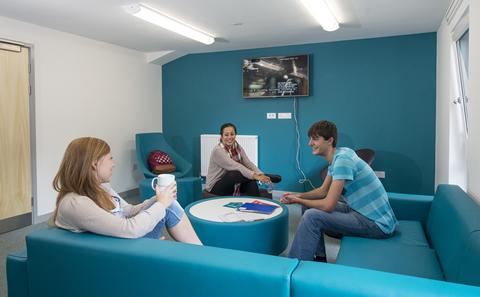
Discover our range of accommodation options and how to apply.
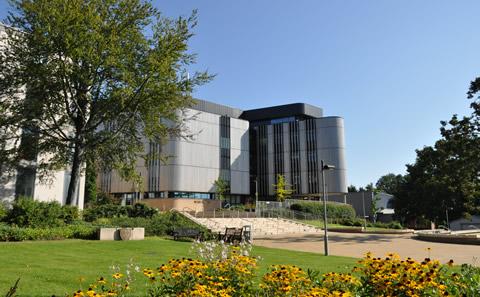
Step into our world and explore the University from wherever you are using our Virtual Open Day.
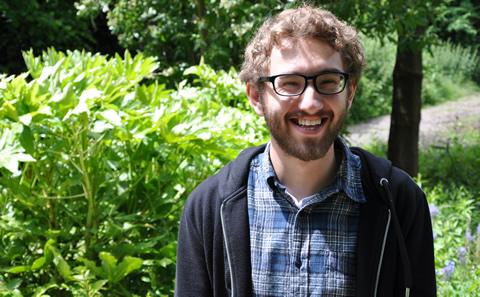
Four current students share their experiences on our Life at Southampton student blog.
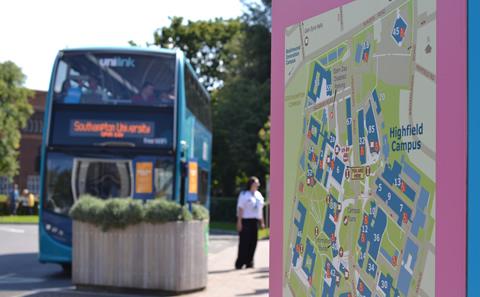
Find out how to take a tour around the campus and meet some of our current students.
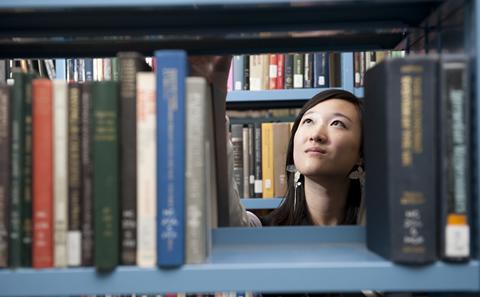
Find out why you should choose Southampton for your undergraduate degree.
Programme structure
The academic year is divided into two semesters, each lasting 12 weeks followed by an examination period. Whichever degree programme you are on, you take eight courses (or 'modules') in each year.
Normally, these ‘other’ modules will be chosen from lists of courses relating to your language(s) or a field of study, but single honours students are allowed to take one module each semester on a subject that need not be related directly to their degree programme. Your choice of modules is made in consultation with your academic advisor, and we try to allow as much flexibility as possible while ensuring that you assemble a coherent ‘package’ of modules.
Combined honours students studying a language together with another subject (such as English or Mathematics) normally take two language modules plus six others, four of which relate to the other subject.
The fields of study
One of the most distinctive features of studying modern languages at Southampton is the range of subjects that you can study in addition to learning the language(s) of your choice. All of the courses that we offer are designed to belong within one or more of our four ‘fields of study’:
(note: these modules are not available to combined honours students studying languages with another subject)
In order to help you choose which fields you would like to concentrate on, you will have the opportunity to take introductory courses in your first year. In consultation with your academic advisor, you will then be in a position to decide whether you would like to select courses from some or all of the fields, or whether you would prefer to specialise in one particular field. If you choose to specialise, you follow a specific ‘track’, which involves selecting the majority of your courses from one field. This will then be reflected in your degree title: for example, French and Spanish (Social and Political Studies).
Teaching methods
The main teaching methods we use for our courses are lectures and seminars (discussion groups of up to 20 students). Lectures are more common in the first year, where the emphasis is on introducing you to fields of study and particular subjects relating to your chosen language(s), but these are always backed up by seminars in order to give you the chance to discuss the content of the lectures.
In the second and final years, most courses are taught in seminars, and the emphasis gradually shifts from tutor-led to student-led discussion. We attach great importance to teamwork – both among members of staff and among students – as well as to developing your ability to work independently. Tutors are always happy to see you individually to give advice on your work or discuss your assignments. Throughout your time here we will monitor your progress carefully, and provide opportunities for formal one-to-one consultation with members of staff.
Assessment
All courses are assessed as soon as they have been taken, so that each year forms a self-contained module. The form of assessment varies according to the aims of the particular course. Assessment methods include coursework (both individual and group assignments), essays of varying lengths, short written projects, oral presentations and written exams. In the year abroad, students carry out an investigative project relating to an issue of current interest in the place where they are staying. In the final year, students have the opportunity of opting to write a dissertation, an individual research project prepared over one semester, which we see as a particularly good foundation for those who are considering postgraduate work.
The obvious reason for studying modern languages is to develop excellent linguistic skills. But there is more to it than that.
It will get you a job
Research shows that UK graduates in modern languages have one of the lowest unemployment rates. Over 60 per cent of British trade is with non-English speaking countries and 75 per cent of the world’s population does not speak English.
It’s exciting
It’s fun, it’s rewarding, it’s challenging and if you choose Southampton, our innovative and flexible curriculum will allow you a wide range of options - you can even start a new language.
It will get you places
Language degrees usually involve some time working or studying abroad, where you will gain first-hand experience of another culture and its traditions.
You’ll meet lots of new people
Using a language is a social activity and language learning leads to encounters with people from many backgrounds. You will develop your verbal, written and presentation communication skills.
You can enjoy new cultures
Being able to engage directly with native speakers will help you to see things from their perspective. It’s a great feeling talking to people in their language, and not having to rely on them speaking English. You will learn more about their history, their culture, their music and food. Meeting other cultures, you start to think about your own country and background.
You’ll find out more about yourself
Most students find their experiences very rewarding at a personal level. They tell us that studying languages opens their minds to understanding other people but that it also affects them personally. On their year abroad they say that you learn to adapt to new surroundings and become less judgemental.
It gives you a lifelong skill
You will develop skills of practical use in almost any career. A second language is a demonstrable skill and will give you the edge on your competitors. Modern languages can be studied with virtually any other subject in a combined degree, from fashion to politics, music to maths. We offer over 50 different degree combinations.
You'll find out about language itself
You’ll have the opportunity to study about the nature of languages in general – an intriguing subject called linguistics. You will learn how the languages we speak today evolved.
Why study modern languages? Because it will open your mind to a vast array of ideas and possibilities, and because it will give an unparalleled preparation for the rest of your life.
Want to find out more?
The Languages Work website provides careers advice, information on courses and work experience.
Your choice of modules is made in consultation with your academic advisor, and we try to allow as much flexibility as possible while ensuring that you assemble a coherent package of modules.

The academic staff are more like friends to us now. They have always been easily approachable and willing to help out. In particular, staff in French are so enthusiastic that lessons are never boring or uneventful!